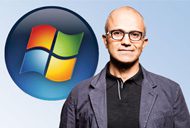Elon Musk, CEO of Tesla and SpaceX, sparked some controversy in early September when he said that an artificial intelligence (AI) arms race could lead to World War III. Microsoft CEO Satya Nadella doesn’t see things the same way, although it should be noted that he heads a corporation that is investing heavily in AI.
Nadella acknowledged to the audience attending a Sept. 27 Reuters Newsmaker event in New York City that Musk’s concern about potential risks from AI is a “worthy discussion for us to have because artificial intelligence is not just another piece of technology, it could be one of the more fundamental pieces of technology the human race has ever created.”
However, Nadella is more of an optimist and cited some positive experiences that some of his company’s AI innovations are already delivering to users as an examples of what the technology’s can achieve.
Nadella described running into a visually-impaired colleague at Microsoft who can now engage more fully with the company by using a mobile application called Seeing AI. This application generates audio descriptions of the user’s environment, including objects, people and text-based content. Microsoft’s life-enhancing AI is also filtering into some of its mainstay productivity applications, noted Nadella.
“We infused some tools into Word and OneNote, called Learning Tools, which use machine reading and some of the AI techniques to help children or anyone with dyslexia to be able to read,” said Nadella. The chief executive added that he believed that AI can “bring more human empowerment, bring more inclusion, so that people can fully participate in our economy and society.”
Touching on the spirit of greater “coopetition” embraced by the company in recent years, which is regarded as a hallmark of Nadella’s tenure as CEO, he said that it’s hardly a new development for Microsoft. Cooperation has long been a trait of the company even if it wasn’t readily apparent to the market, he said.
Most people may not realize it, but the company “built Microsoft Office—our Office applications, whether it’s Word or Excel—for the Macintosh first; Windows came later,” Nadella cited as an example of software maker’s long history of fostering industry partnerships. Although the company will continue to stand up to rivals and “compete hard” in the marketplace, Microsoft’s product and technology strategies are more collaborative than in years past, he added.
Once considered Linux’s mortal enemy, Microsoft has come to support the open-source operating system and the open-source community at large. In November 2016, the company formally buried the hatchet by joining the Linux foundation as a Platinum member.
At the Microsoft Ignite conference in Orlando, Fla., Sept. 25-29, the company officially released its SQL Server database software for Linux, Nadella noted. “To me, open source is also another strategy,” he said, before reminding attendees that Microsoft is one of the biggest code contributors to various open-source projects, including Linux, Hadoop and R, a statistical programming language.
